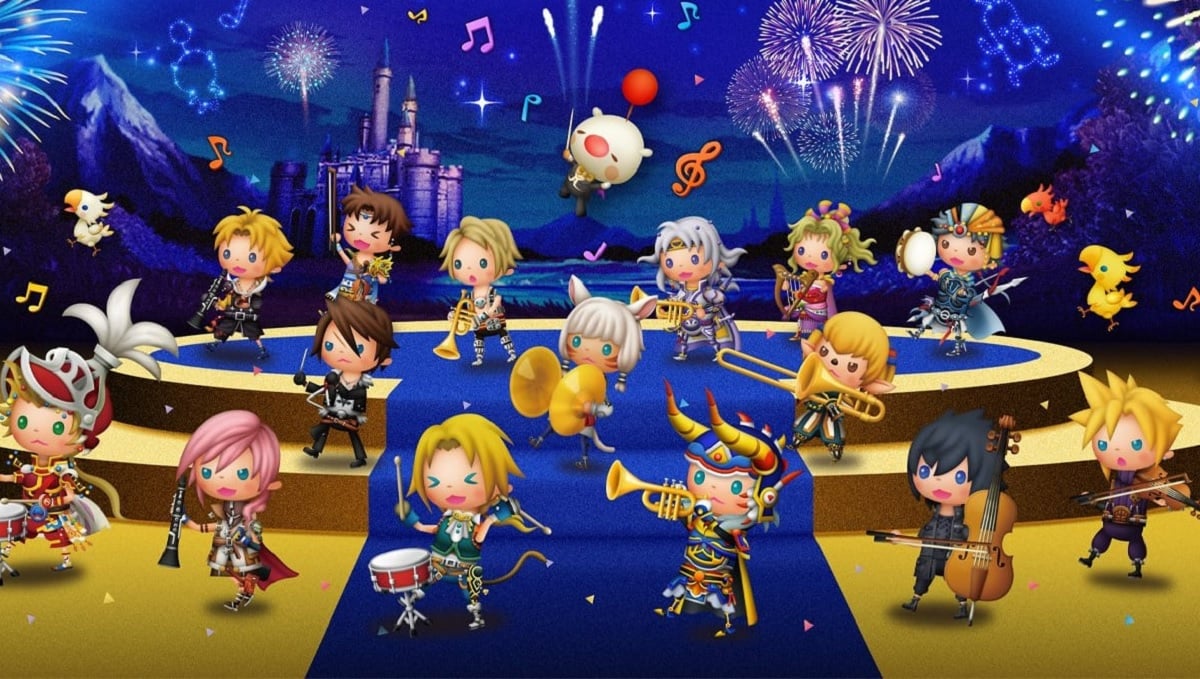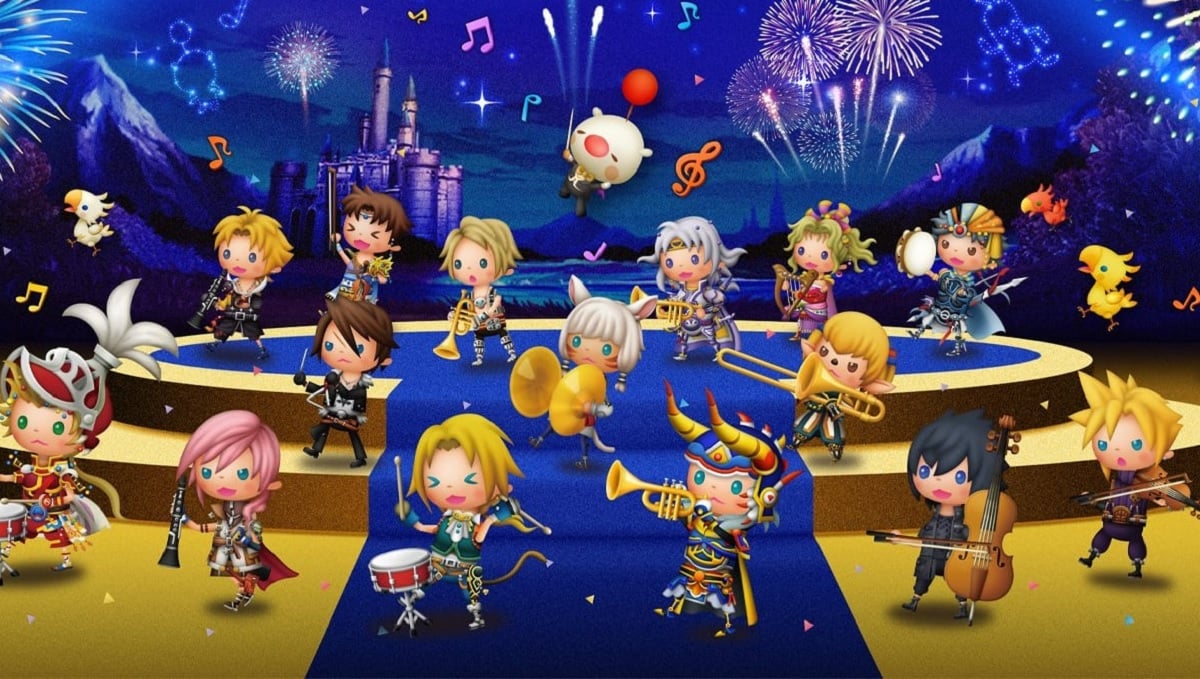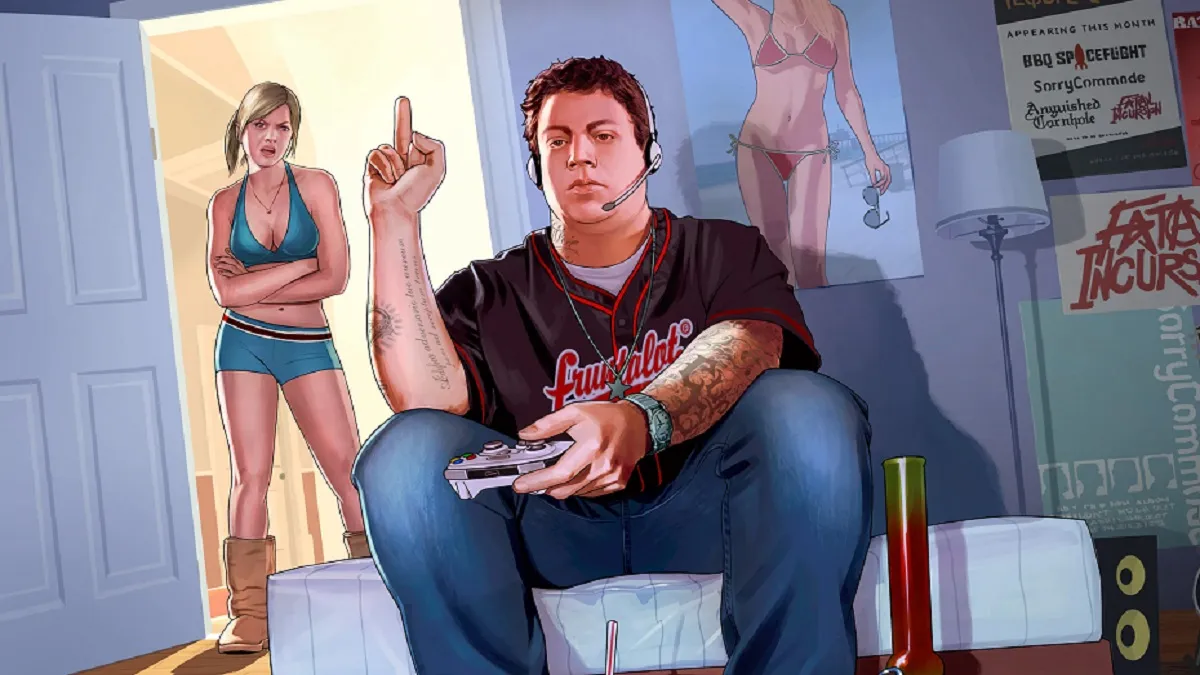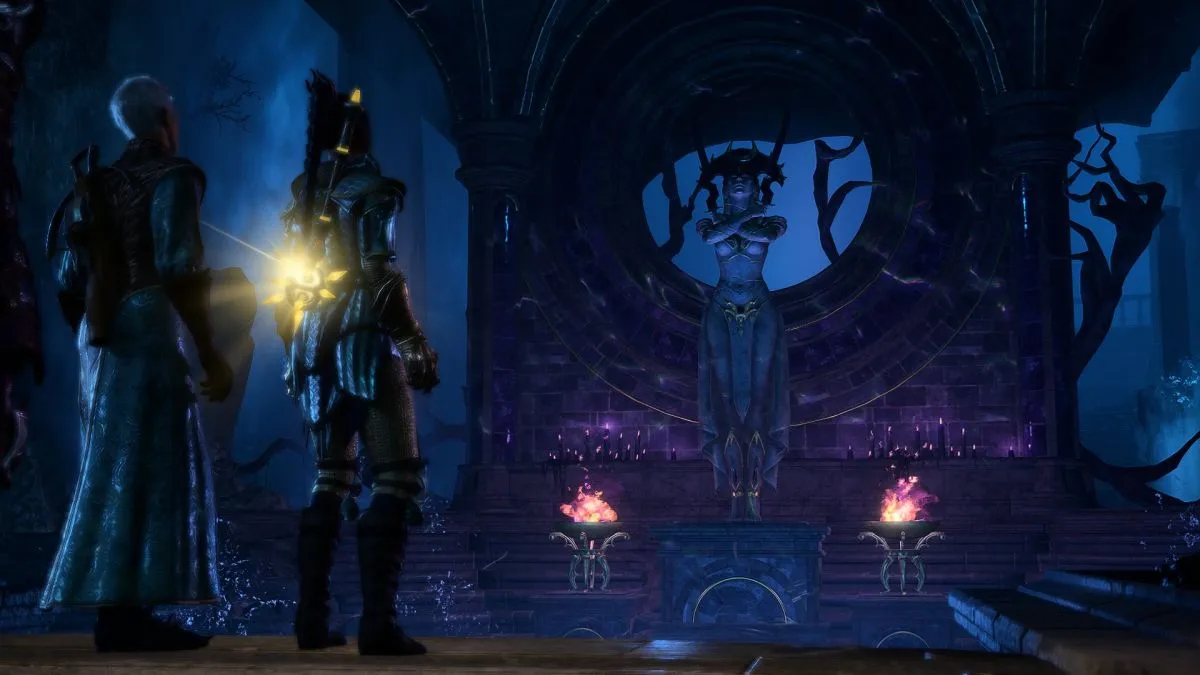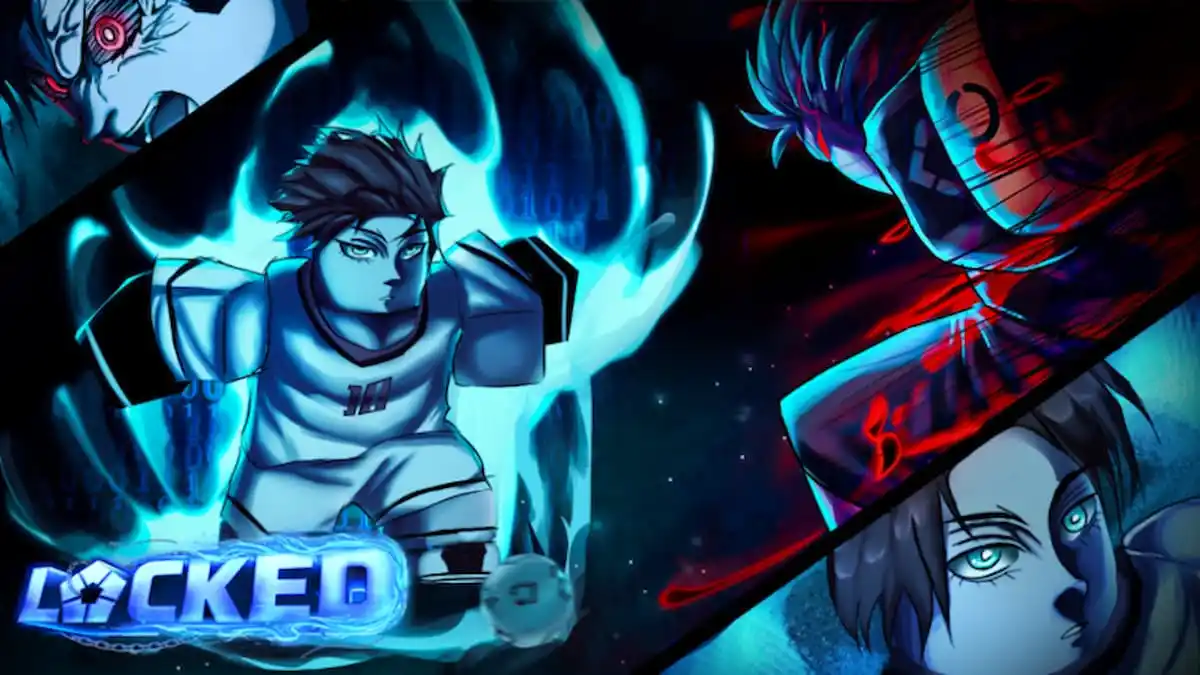Not every Final Fantasy game is great, but maybe every Final Fantasy game is great
Last year, I visited Heinz Hall in Pittsburgh, Pennsylvania to see the 35th-anniversary edition of the Distant Worlds: Music from Final Fantasy concert series. I don’t love every Final Fantasy game, but sitting in that concert hall, with a comically overpriced music box in a bag at my feet, for a couple of hours, I did. And when I play Theatrhythm Final Bar Line, I love every Final Fantasy game again.
Depending on which games you want to count, Theatrhythm Final Bar Line, a mechanical celebration of the music of Final Fantasy, is somewhere between the third and seventh Theatrhythm game. I love the series — developer indieszero has an impressive understanding of what makes music interesting, and these games have always done a fantastic job of translating songs from the ears to the fingers. Unsurprisingly, the studio has done its thing once more, and Final Bar Line feels amazing.

Theatrhythm Final Bar Line (PS4, Switch [Reviewed])
Developer: indieszero Corporation, Ltd.
Publisher: Square Enix
Released: February 16, 2023
MSRP: $49.99
The first thing I noticed when I started playing Final Bar Line was just how much stuff there is. The game’s campaign mode, dubbed “Series Quests”, features 29 “Title” banners. Each of these banners features a series of quests (oh, hey, that’s why they’re called Series Quests) full of music from a single Final Fantasy game or, in some instances, a small handful of related titles; the shortest of these questlines features five stages, and the longest boasts 32, with most of them leveling out somewhere in the 10-20 range.
Immediately, I was worried. The last Theatrhythm Final Fantasy game featured 221 tracks at launch. My favorite indieszero rhythm game, Kingdom Hearts: Melody of Memory, features just 143 songs. This one comes with 385 tracks in the base game. Square Enix provided Destructoid with the Premium Digital Deluxe edition, which adds over two dozen additional tracks. Every single song has between three and four beatmaps corresponding to different difficulty levels. It’s an absurd amount of content, and I was concerned that it would spread itself too thin by playing with this “more-is-more” mentality.
As far as I can tell, though, that didn’t happen at all. I haven’t unlocked every single track yet, but everything I’ve played has felt carefully crafted and meaningful. A lot of love has gone into examining Nobuo Uematsu’s Final Fantasy VI soundtrack, obviously, but the same reverence has been applied to Kumi Tanioka’s work on Final Fantasy Fables: Chocobo’s Dungeon. It seems as though every song featured in Final Bar Line is there not simply because a higher track count looks good on a store page, but because the developers found something interesting in a song and wanted to share it with the player. It’s incredibly addictive, but it’s also very intentional.
Paying attention to the little things
I think that’s central to what makes Theatrhythm Final Bar Line great. Often, people will suggest that rhythm games can help a player become better at playing music — this is the philosophy behind something like Rocksmith, which uses rhythm gaming mechanics to teach players how to play the guitar. But Theatrhythm Final Bar Line has a different proposition: maybe rhythm games like this make the player better at listening to music. When tapping to the beat reveals something unheard in a composition, it makes the music itself better. Everything in Final Bar Line feels so good because it’s apparent that the game wants you to experience the music through a new lens, not to play it on an instrument, but simply to understand the finer intricacies of the piece.
In laid-back Field Music Stages like Final Fantasy XV‘s “Somnus,” certain notes require that you hold a button down and move the joystick, to feel the flow and understand why separate notes feel so connected, and why that connection translates into serenity. Battle Music Stages like Final Fantasy II‘s iconic “Battle Theme 1” ask that you tap and flick the joystick rapidly, to recognize the abrupt stop-and-start found in so much of Final Fantasy‘s action-oriented music. Some infrequent Golden Globes-level category fraud aside (why is “Aerith’s Theme” considered a Battle Music Stage?), everything works astonishingly well.
It expertly tailors its mechanics to demand that you feel the music, and, more importantly, that you get it. The game wants you to notice the decisions being made in the composition, to appreciate why the soundtrack to a game is the way it is. When you unlock Event Music Stages, which show you moments from a game to accompany the tunes, it feels like you have a better understanding of why certain songs fit into their respective games, and why accompaniment is so important on a mechanical level.

In addition to being a very deliberate, thoughtful meditation on how music works and how it enhances a game, Final Bar Line is also just fun. It’s immensely satisfying to land a perfect chain, and every time I came up just a couple of notes short, I immediately restarted a track and tried again. I’ve taken to plucking away at Field Music Stages to wind down before bed, although I almost always keep myself up chasing a higher score. As always, indieszero is great at doling out dopamine when you’ve earned it and withholding it in all the most engaging ways.
The game forces you to understand the music, but it also encourages you to enjoy it. Between the (admittedly redundant) music player, the precise beatmaps, and the playful controls, it feels like it wants the player to see music as an art, a machine, and a toy. It’s an enriching time and a fun time, a rare but potent combination. It won’t teach you any real music theory, but Theatrhythm Final Bar Line clearly loves music, and it’s hard not to feel and reflect that love.
Sorry, still not an RPG
I’m not sure if Theatrhythm Final Bar Line loves RPGs, though. If the beatmaps betray an infectious fondness for music, then the indifference towards RPG systems is downright contagious. There’s nothing remotely interesting about the ability-based progression systems. As you complete levels, your unlockable doll-like Final Fantasy characters will level up, earning more and more abilities as they go.
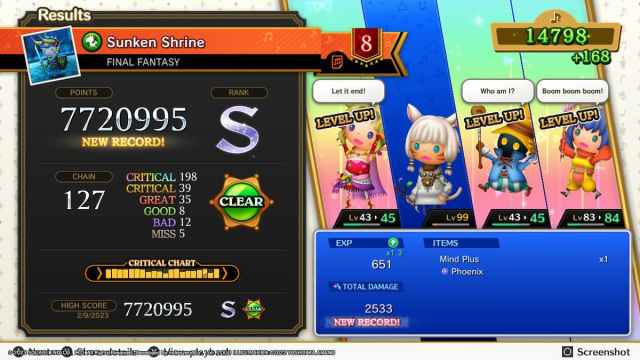
But actually “using” these abilities is a totally passive affair. Most abilities are triggered by simply hitting a lot of notes or getting halfway through a song, which you’ll be doing anyways (this is a rhythm game, after all). They also don’t feel impactful when they automatically occur — the only abilities that seem to affect the active gameplay are healing skills. Every other ability only changes what’s happening in the “battles,” so once you have a healer or two in your party, there’s no real reason to think about that system ever again. The only time you’ll have to worry about your party at all is when a track comes with a specific goal asking you to deal lots of damage or kill a certain boss, and even then, once you’ve swapped your characters out accordingly, literally nothing will change about the way you approach the song.
Of course, Theatrhythm Final Bar Line is a rhythm game, not an RPG. If I want a complex battle system that demands intensive player input, I can wait for Final Fantasy XVI. Still, it would have been nice if this concept was just a little more fleshed-out. As it stands, it feels like a vestigial wink at its parent franchise that doesn’t say or do anything. It’s only frustrating because the actual moment-to-moment gameplay feels as though it’s saying and doing so much. When love defines the core, it’s a bit of a bother that disinterest defines the surroundings.
More money, please
I also want to quickly comment on Final Bar Line‘s pricing model. For the most part, I think it’s a pretty good example for rhythm games to follow — the base game is rich with almost everything a casual fan could want, the Digital Deluxe edition includes treats for superfans like alternate compositions and rearrangements of different songs, and future song packs will focus on other franchises. If you only want to pay for the base game, you’ll get a full experience, and one that’s well worth the price of admission. If you’re the type who wants to shell out a little more money, you get access to stuff you’ll actually appreciate. I was really glad to see music by The Primals, Final Fantasy XIV composer Masayoshi Soken’s heavy metal Final Fantasy cover band. Most of the bonus content here won’t mean much to a layman but will still be rewarding to the kind of person who buys a Digital Deluxe edition.

But one thing bugs me: “Zanarkand” is exclusive to the Digital Deluxe edition of Theatrhythm Final Bar Line. Normally, I wouldn’t call attention to this at all. The absence of a single track doesn’t harm the value of a project this massive. But this song from Final Fantasy X is incredibly iconic. Where the other deluxe offerings are generally niche prizes for dedicated fans, “Zanarkand” is such an obvious crowd-pleaser that it was part of the encore at that concert I mentioned earlier. Locking it behind a second paywall just calls to mind Square Enix’s other slimy business practices of late.
While the rest of the game reminds me of the best moments in the studio’s history, this one element makes me think of the studio’s penchant for NFT-shilling and FOMO marketing. It’s a little detail, but it almost feels like Square Enix poking at the outer limits of what consumers will allow, and it just leaves a bad taste in my mouth. If you can get past the subpar RPG bits and standard Square Enix business, though, Theatrhythm Final Bar Line will reward you with a truly brilliant experience. It’s a very good rhythm game on its own, but it also acts as a lovely companion piece to the Final Fantasy franchise at large.
Every Final Fantasy game is enhanced by its association with Theatrhythm Final Bar Line, because every Final Fantasy soundtrack is given definition and thus made more beautiful. As I’ve been playing Theatrhythm, I’ve been going back and revisiting some of my less-beloved Final Fantasy games — I won’t name them here for fear of inciting war — and I sincerely appreciate those games more now. Theatrhythm Final Bar Line is a testament to the power of a soundtrack, and it’s well worth the attention of any fan of Final Fantasy, music, or Final Fantasy music.
[This review is based on a retail build of the game provided by the publisher.]
